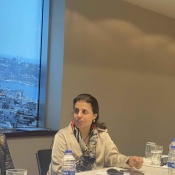Lecture Explores "The Israeli Situation after the Elections"
The Cultural Committee at the Faculty of Arts organized on April 28, 2015 a lecture entitled: "Israel's situation after the elections," delivered by the researcher and expert on Israeli affairs Professor Amal Jammal and moderated by the media professor Walid al-Shurafa.
Jammal said that the main motive for this lecture is manifested in the results of the Israeli elections that took place last March, stressing that there are clear indicators that the candidate to form a coalition government "Benjamin Netanyahu" will succeed in forming a government in the next few days
Jammal added that the recent elections were held two years earlier than the usual time, and the reason for holding the Israeli elections ahead of schedule is the disagreement between the "Likud" party- the ruling party- led by Netanyahu and the party "Israel is Our Home," led by the Israeli Minister "Avigdor Lieberman.
Jammal added that the differences between "Netanyahu" and the Finance Minister in the previous Israeli government, "Yair Lapid" began when Lapid declared his intention to become the prime minister – a personal difference that focused on several issues including: Lapid’s attempt to issue a Knesset decision regarding tax exemption on apartments in order to resolve the housing problem in Israel, which was opposed by "Netanyahu".
Jammal said that the Israeli trends today are to form a conservative right-wing government in order to achieve the ideological vision of the government, which undermines any chance for the establishment of an independent Palestinian state under this government.
Jammal stressed that there are several factors that play a role in shaping the Israeli policy, most importantly is the psychological security factor, which is based on existential threat to Israel and external threats, such as the Iranian threat. The other factor is the ethnic factor, since the Israeli society is very much like a tribal community divided into four parts or tribes, Palestinians, ultra-orthodox Jews, Eastern Jews and European Jews. The third important factor is the physical factor, meaning that the Israeli society is divided on national class basis.
In his opening statement, Shurafa said that this lecture is an attempt to explore what is happening inside Israel, and to analyze the Israeli society behavior and its internal and external relations.
Dr. Jammal served as director of political communication branch in the Tel Aviv University Department of Political Science. He graduated from the Free University of Berlin in Germany in 1996. His research interests are centered on comparative political theory and telecommunications, as well as political thought and democratization processes, as well as the civil society. He wrote several books and conducted research published in different languages and countries, including his book on "media policies and democracy in Palestine," which was published by "Sussex Publishing House" in Britain.







